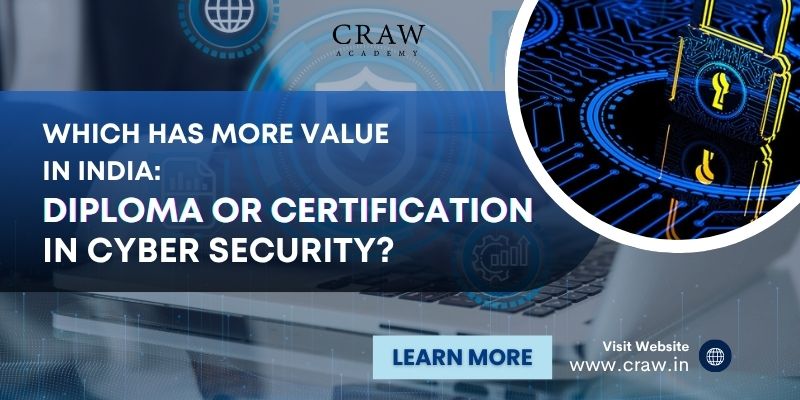Diploma vs Certification in Cyber Security: Introduction
This article dives deep into the difference between diploma and certification in cyber security, analyzes their career scope in India, and helps you decide which is better – diploma or certification in cyber security based on your career goals. As cyber threats continue to rise globally, the demand for qualified cybersecurity professionals in India is growing faster than ever. But when it comes to starting a career in cybersecurity, many aspirants face a critical question — Diploma vs Certification in Cyber Security: What to Choose?
Your Future Starts Here – Reserve Your FREE Demo Class Now!
Difference Between Diploma and Certification in Cyber Security
To make an informed choice, it’s important to first understand the key differences between a diploma and a certification in cyber security. While both aim to build expertise in securing systems and networks, they differ significantly in terms of depth, duration, recognition, and career goals.
Here’s a comprehensive comparison:
| Aspect | Diploma in Cyber Security | Certification in Cyber Security |
|---|---|---|
| Duration | 6 months to 2 years depending on the level and institution | 1 week to 6 months based on course and certification body |
| Content Coverage | Covers broad topics including networking, ethical hacking, cryptography, security compliance | Focuses on specific skills or tools like CEH, CompTIA Security+, CISSP, or OSCP |
| Target Audience | Ideal for beginners, students, and freshers seeking foundational knowledge | Best for working professionals and IT graduates looking to upskill or specialize |
| Delivery Mode | Classroom-based or hybrid with assignments, labs, and exams | Online, hybrid, or bootcamp formats with hands-on simulations |
| Eligibility | Usually 10+2 or graduate level education; varies by institute | Often no strict eligibility, but IT background may be required for advanced certifications |
| Recognition | Awarded by universities, polytechnics, or technical institutions | Offered by global vendors like EC-Council, CompTIA, Cisco, Offensive Security, etc. |
| Cost | Moderate to high (₹30,000 – ₹1,50,000+) | Varies (₹10,000 – ₹1,00,000+), depending on the credential and exam fees |
| Career Outcome | Entry into roles such as Security Analyst, SOC Trainee, IT Auditor, Pen Tester (Jr. Level) | Qualifies you for specific roles like Ethical Hacker, Cloud Security Analyst, etc. |
| Job Value | Long-term academic and professional growth | Short-term career advancement and job-specific eligibility |
Which Has More Value in India: Diploma or Certification in Cyber Security?
In India, both diplomas and certifications in cyber security hold value, but their relevance varies based on your career goals and the industry you aim to enter.
A diploma is typically more beneficial for candidates looking to build a broad academic foundation and pursue government jobs or further education. It provides structured learning and is often required for eligibility in formal employment sectors. On the other hand, a certification is more targeted and skill-based. It is ideal for those seeking quick job placement, specialization, or career advancement in the private sector. Certifications are widely recognized by IT companies and startups, especially in roles that require up-to-date, hands-on skills.
| Criteria | Diploma in Cyber Security | Certification in Cyber Security |
|---|---|---|
| Recognition | Recognized by educational boards and institutions | Recognized by IT industry and global companies |
| Ideal For | Beginners, students after 10+2, government aspirants | IT professionals, job seekers, career switchers |
| Duration | 6 months to 2 years | Few weeks to 6 months |
| Focus Area | Broad and foundational knowledge | Specific skills and tools (e.g., ethical hacking, cloud) |
| Value in Government Sector | High | Moderate |
| Value in Private Sector | Moderate | High |
| Career Growth Potential | Long-term, steady growth | Fast-track growth in specific roles |
| Cost | Generally higher | Relatively affordable |
| Job Opportunities | Network technician, security analyst (entry-level) | Pen tester, SOC analyst, cyber consultant |
| Flexibility | Less flexible (fixed syllabus and duration) | Highly flexible (can choose niche areas) |
Which Is Better – Diploma or Certification in Cyber Security?
When choosing between a diploma and a certification in cyber security, the answer depends on your career stage, background, and long-term goals. A diploma in cyber security is generally better suited for beginners or students fresh out of school (10+2), as it provides a broad academic foundation. It typically covers essential topics such as network security, operating systems, ethical hacking, malware analysis, and security compliance in a structured format. Diplomas are also more widely accepted in government jobs and PSUs, where formal qualifications are essential.
In contrast, a certification in cyber security is ideal for those who already have some IT knowledge or work experience and want to upskill quickly or specialize in a specific area, such as penetration testing, cloud security, or incident response. Certifications like CEH (Certified Ethical Hacker), CompTIA Security+, and CISSP are globally recognized and preferred by private companies, MNCs, and startups for their job-oriented and practical approach. They’re also often completed in a much shorter duration compared to a diploma.
Which Should You Choose Diploma vs Certification in Cyber Security?
Choosing between a diploma and a certification in cyber security depends on your individual learning goals, background, and the type of career path you want to pursue.
If you are a beginner, a 12th pass student, or someone looking to build a strong and structured foundation in cyber security, then a diploma is the right choice. It offers a comprehensive curriculum, hands-on training, and academic recognition, making it ideal for those aiming to start from scratch and eventually explore opportunities in government jobs, higher education, or long-term technical roles.
On the other hand, if you are an IT professional, a graduate, or someone looking to switch careers or advance quickly in a specific cyber security domain, then a certification is more suitable. Certifications are skill-specific, industry-recognized, and faster to complete, allowing you to specialize in areas like ethical hacking, network security, cloud security, or digital forensics. They are particularly valuable in private sector jobs, startups, and global tech companies.
| Your Goal | Best Choice |
|---|---|
| Start a career from scratch | Diploma |
| Learn fast & get job-ready | Certification |
| Aim for government job | Diploma |
| Specialize in a specific domain | Certification |
| Long-term academic value | Diploma |
| Add credibility to resume quickly | Certification |
For the most comprehensive career growth, many experts recommend a hybrid approach: Diploma + Certification – a combination that ensures both depth and specialization in the evolving field of cyber security.
Cyber Security Diploma vs Certification Scope in India
In India’s rapidly evolving digital ecosystem, both diplomas and certifications in cyber security offer excellent career opportunities—but their scope differs based on your experience level, target sector, and career goals.
A Diploma in Cyber Security is ideal for beginners, students, or recent 12th pass candidates who want to build a strong foundation in networking, ethical hacking, data protection, and security operations. These programs are typically offered by polytechnics, vocational institutes, and professional training academies, and they provide in-depth theoretical and hands-on knowledge over a span of 6 to 24 months. A diploma prepares you for entry-level roles such as Security Operations Center (SOC) Analyst (L1), Junior Pen Tester, IT Security Assistant, or Network Security Technician. Additionally, many government bodies, public sector undertakings (PSUs), and defense services in India prefer diploma holders due to their recognized academic credibility.
On the other hand, a Cyber Security Certification is more focused, skill-driven, and job-specific. It is best suited for IT professionals, graduates, or career switchers who already have a basic understanding of computers or networks. Certifications like CEH (Certified Ethical Hacker), CompTIA Security+, OSCP, and CISSP are globally recognized and offer quick entry into high-paying roles like Ethical Hacker, Cloud Security Engineer, Security Analyst, and Penetration Tester. In India, certifications are highly valued by private companies, MNCs, IT service providers, and startups, especially in cities like Bengaluru, Pune, Delhi NCR, and Hyderabad. They signal that you possess up-to-date, practical expertise and are ready to work on real-time security threats.
Here’s a quick comparison of the scope of diploma vs certification in India:
| Category | Diploma in Cyber Security | Certification in Cyber Security |
|---|---|---|
| Ideal For | Beginners, students, 12th pass, and non-technical aspirants | IT graduates, professionals, and job switchers |
| Scope in Govt Sector | High – recognized by PSUs, MeitY, and defense services | Moderate – supplementary value only |
| Scope in Private Sector | Moderate – some private firms hire diploma holders | Very High – widely preferred for skilled roles |
| Common Job Roles | SOC Analyst (L1), Network Security Assistant, Cyber Intern | Ethical Hacker, Security Analyst, Pen Tester, Cloud Security Specialist |
| Career Growth | Solid foundation; good for further academic progression | Faster promotion and global career opportunities |
| Time to Complete | 6 months to 2 years | 1 week to 6 months |
| Entry Barrier | Low – mostly open to 10+2 candidates | Moderate – often requires some IT knowledge |
Frequently Asked Questions (FAQs)
1. What is the main difference between a diploma and a certification in cyber security?
A diploma offers broad academic and technical training over several months or years, while a certification is short-term and focused on specific skills, tools, or roles in cyber security.
2. Which is better for freshers in India: diploma or certification in cyber security?
For freshers, a diploma is usually better as it builds a strong foundation in networking, system security, and ethical hacking, helping beginners start from scratch.
3. Can I do both a diploma and a certification in cyber security?
Yes, doing both is highly recommended. A diploma provides the base, and certifications add specialized, industry-recognized skills that improve employability.
4. Is a cyber security certification enough to get a job in India?
Yes, certifications like CEH, CompTIA Security+, or OSCP can help you land jobs in private companies, especially if you already have IT experience.
5. Which one is more valuable for government jobs: diploma or certification?
Diplomas are more valuable for government jobs in India, as they are recognized by educational boards and fulfill eligibility criteria for many government postings.
6. What is the duration of a diploma vs certification in cyber security?
A diploma usually takes 6 months to 2 years, while certifications can be completed in 1 week to 6 months, depending on the level and content.
7. Do certifications need renewal?
Yes, many certifications like CEH, CISSP, and CompTIA Security+ require renewal or continuing education credits every 2–3 years to stay valid.
8. Are online certifications in cyber security valid in India?
Yes, online certifications from reputed platforms and vendors like EC-Council, CompTIA, or Offensive Security are widely accepted in India, especially in the private sector.
9. What is the average salary after a diploma or certification in cyber security in India?
Diploma holders: ₹2.5 – ₹5 LPA (entry-level)
Certification holders: ₹4 – ₹12 LPA, depending on experience and the type of certification
10. Can I pursue a cyber security diploma or certification after 12th?
Yes, many institutes offer diploma courses after 12th. For certifications, basic IT knowledge is recommended but not always mandatory.
Conclusion
Choosing between a diploma and a certification in cyber security ultimately depends on your career objectives, current skill level, and the type of job roles you’re targeting. While a diploma builds a deep, structured foundation and opens doors in academia and government sectors, certifications offer flexibility, industry recognition, and faster job placements in private and international firms.
In the Indian context, both qualifications have strong relevance—diplomas are ideal for beginners, and certifications are better for specialization and professional growth. For long-term success, combining both is often the smartest strategy.
No matter which path you choose, cyber security remains one of the most promising and future-proof career options in India and globally. So, evaluate your goals, select the right path, and invest in learning—the digital world needs defenders like you.




